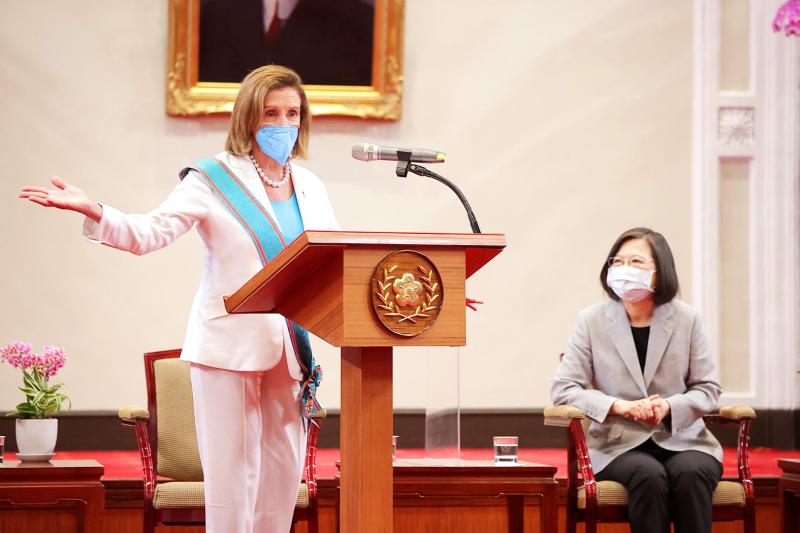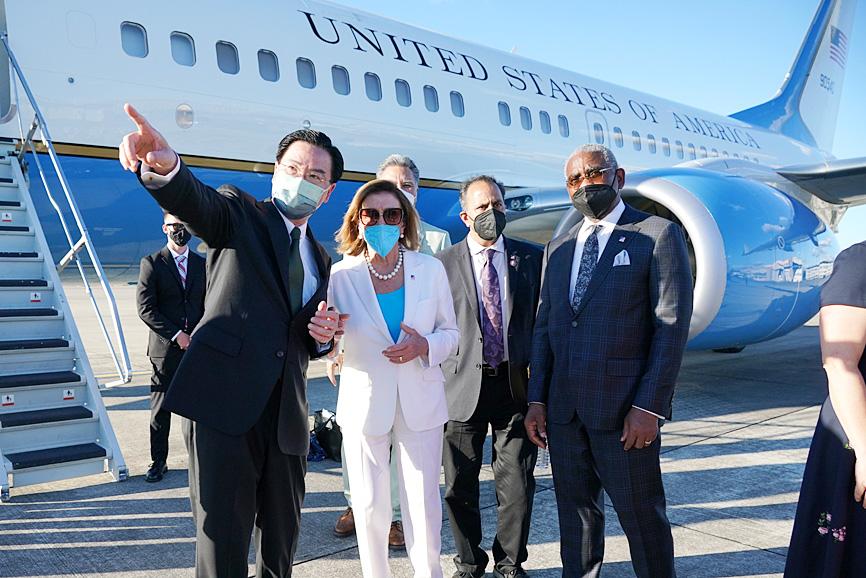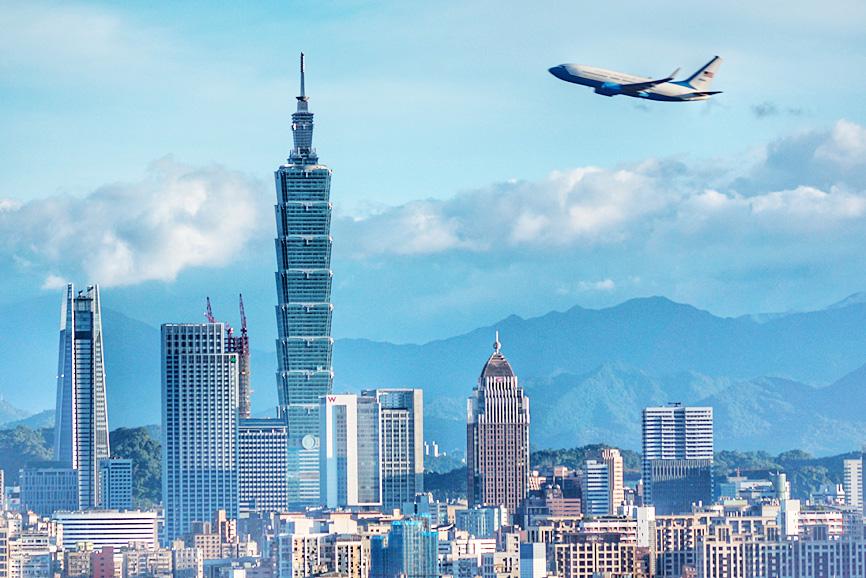US House of Representatives Speaker Nancy Pelosi yesterday said that her delegation traveled to Taipei to make it “unequivocally clear” that the US stands with Taiwan and is proud of the two sides’ enduring friendship.
President Tsai Ing-wen (蔡英文) in the morning received the delegation at the Presidential Office in Taipei, where she awarded Pelosi the Order of Propitious Clouds with Special Grand Cordon in recognition of her long-term support and contributions to the Taiwan-US relationship.
Pelosi said she accepted the award with “great humility” on behalf of the members of the US Congress who are united in their support for Taiwan and looks forward to wearing it on Capitol Hill “as a symbol of our treasured friendship.”

Photo: EPA-EFE / PRESIDENTIAL OFFICE
“Forty-two years ago, America made a bedrock promise to always stand with Taiwan,” she said, referring to the US’ Taiwan Relations Act of 1979.
“On this strong foundation, we have built a thriving partnership grounded in our shared values of self-government and self-determination,” with a focus on mutual security interests and economic ties, she said.
Security, economy and governance are the three main pillars of any US congressional delegation — all areas in which the US and Taiwan enjoy strong cooperation, she said, congratulating Taiwan for being a “model to the world” regarding its success in handling the COVID-19 pandemic.

Photo: EPA-EFE / MINISTRY OF FOREIGN AFFAIRS
Pelosi also called attention to Taiwan’s history of democratization, calling its story “an inspiration to all freedom-loving people.”
“Out of a crucible of challenge you have formed a flourishing democracy, one of the freest in the world, proudly led by a woman president,” she said.
Apart from showing solidarity, the delegation visited to listen to Taiwanese and learn how to participate in the region in a way that allows Taiwan to be successful, she added.

Photo: Lu Chun-wei, Taipei Times
“Now more than ever, America’s solidarity with Taiwan is crucial, and that is the message we are bringing here today,” Pelosi said. “America’s determination to preserve democracy here in Taiwan and around the world remains iron-clad, and we’re grateful for the partnership of the people of Taiwan in this mission.”
Tsai thanked Pelosi for her devoted friendship with Taiwan.
Pelosi previously visited Taiwan in October 1999, showing particular concern over the 921 Earthquake that happened on Sept. 21 just before her visit, Tsai said, assuring the speaker that Taiwan in the decades since has rebuilt and weathered even more challenges.
With Russia invading Ukraine earlier this year, security in the Taiwan Strait has become a global focus with serious implications for the entire Indo-Pacific region, Tsai said.
To cope with these uncertainties, she outlined three key principles:
“First, facing deliberately heightened military threats, Taiwan will not back down,” and will continue to uphold its sovereignty and hold the line of defense for democracy, she said.
She also vowed to do “whatever it takes” to bolster Taiwan’s self-defense capability, making the nation a key stabilizing force for regional security.
“Third, Taiwan is a reliable and trusted cooperative partner of the United States,” she said, pledging to work with Congress and the US administration on security, economic development, talent cultivation and supply chains.
After the meeting, Tsai and Pelosi held a joint news conference for representatives from local and international media, as well as a Japanese representative.
Pelosi said that she and Tsai discussed the three pillars, as well as a trade agreement that “might be possible soon.”
Asked whether Taiwan could expect more visits by high-level US delegations, Pelosi said she “certainly hopes so,” but added that other recent visits by US representatives did not attract the same kind of attention.
Regarding the potential for Tsai or other Taiwanese officials to address the US Congress, Pelosi said that they have not held a joint session for about three years due to the COVID-19 pandemic and other factors.
Regarding the possibility of a response by Beijing, she said: “I think that whatever China is going to do, they will do in their own good time. What excuse they might use to do it is another thing.”
“I do think it’s really important for the message to be clear that in the US House and Senate, Democrats and Republicans are committed to the security of Taiwan in order to have Taiwan most effectively defend themselves,” she said.
To counter China, “we have to show the world the success of the people of Taiwan,” Pelosi said. “Their courage to change their own country to become more democratic, their respect for people is, quite frankly, a model in this region, but we’re not here to talk about mainland China. We’re here to talk about Taiwan.”
Pelosi’s Taiwan visit was the first of a sitting US House speaker since 1997, when Republican Newt Gingrich traveled to Taipei and met with then-president Lee Teng-hui (李登輝).
The other members of Pelosi’s delegation are House Foreign Affairs Committee Chairman Gregory Meeks, House Veterans Affairs Committee Chairman Mark Takano, House Ways and Means Committee Vice Chair Suzan DelBene, House Economic and Consumer Policy Subcommittee Chairman Raja Krishnamoorthi and US Representative Andy Kim.
Pelosi arrived in Taipei at 10:43pm on Tuesday for the third leg of her Asia tour.
During her 19-hour stay, Pelosi also visited the legislature, the Jingmei White Terror Memorial Park in New Taipei City and attended a noon banquet at the Taipei Guest House attended by businesspeople and national security officials, including Taiwan Semiconductor Manufacturing Co (台積電) founder Morris Chang (張忠謀).
Her aircraft departed from Taipei International Airport (Songshan airport) at 6:01pm yesterday to continue the rest of her Indo-Pacific trip, which was to take her to South Korea and Japan before heading back to the US.
Additional reporting by Lu Yi-hsuan and CNA

CHAOS: Iranians took to the streets playing celebratory music after reports of Khamenei’s death on Saturday, while mourners also gathered in Tehran yesterday Iranian Supreme Leader Ayatollah Ali Khamenei was killed in a major attack on Iran launched by Israel and the US, throwing the future of the Islamic republic into doubt and raising the risk of regional instability. Iranian state television and the state-run IRNA news agency announced the 86-year-old’s death early yesterday. US President Donald Trump said it gave Iranians their “greatest chance” to “take back” their country. The announcements came after a joint US and Israeli aerial bombardment that targeted Iranian military and governmental sites. Trump said the “heavy and pinpoint bombing” would continue through the week or as long

TRUST: The KMT said it respected the US’ timing and considerations, and hoped it would continue to honor its commitments to helping Taiwan bolster its defenses and deterrence US President Donald Trump is delaying a multibillion-dollar arms sale to Taiwan to ensure his visit to Beijing is successful, a New York Times report said. The weapons sales package has stalled in the US Department of State, the report said, citing US officials it did not identify. The White House has told agencies not to push forward ahead of Trump’s meeting with Chinese President Xi Jinping (習近平), it said. The two last month held a phone call to discuss trade and geopolitical flashpoints ahead of the summit. Xi raised the Taiwan issue and urged the US to handle arms sales to

State-run CPC Corp, Taiwan (CPC, 台灣中油) yesterday said that it had confirmed on Saturday night with its liquefied natural gas (LNG) and crude oil suppliers that shipments are proceeding as scheduled and that domestic supplies remain unaffected. The CPC yesterday announced the gasoline and diesel prices will rise by NT$0.2 and NT$0.4 per liter, respectively, starting Monday, citing Middle East tensions and blizzards in the eastern United States. CPC also iterated it has been reducing the proportion of crude oil imports from the Middle East and diversifying its supply sources in the past few years in response to geopolitical risks, expanding

Pro-democracy media tycoon Jimmy Lai’s (黎智英) fraud conviction and prison sentence were yesterday overturned by a Hong Kong court, in a surprise legal decision that comes soon after Lai was jailed for 20 years on a separate national security charge. Judges Jeremy Poon (潘兆初), Anthea Pang (彭寶琴) and Derek Pang (彭偉昌) said in the judgement that they allowed the appeal from Lai, and another defendant in the case, to proceed, as a lower court judge had “erred.” “The Court of Appeal gave them leave to appeal against their conviction, allowed their appeals, quashed the convictions and set aside the sentences,” the judges